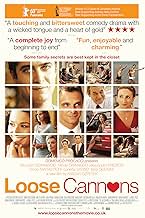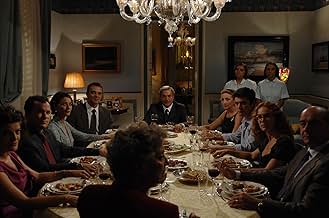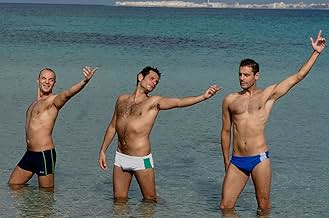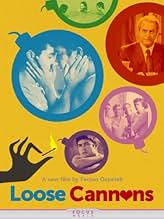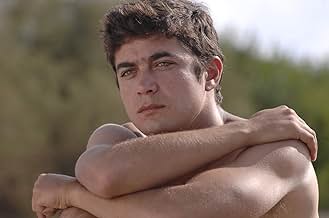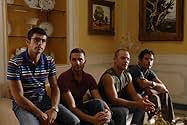Tommaso and Antonio are two gay brothers. When Tommaso is about to come out, Antonio says it first. Outraged, their father banishes Antonio from the clan, before being struck down by a heart... Read allTommaso and Antonio are two gay brothers. When Tommaso is about to come out, Antonio says it first. Outraged, their father banishes Antonio from the clan, before being struck down by a heart attack.Tommaso and Antonio are two gay brothers. When Tommaso is about to come out, Antonio says it first. Outraged, their father banishes Antonio from the clan, before being struck down by a heart attack.
- Director
- Writers
- Stars
- Awards
- 34 wins & 34 nominations total
- Director
- Writers
- All cast & crew
- Production, box office & more at IMDbPro
Featured reviews
Although, the director wasn't born in Italy ( he is of Turkish origin), he had made a movie in very Italian style.
First, let me write about a music. It is phenomenal. My favourite choice is Nina Zilli's song "50 mila" - very fresh, soulful and "remind me of summer" track. Italian movies are often associated with good music - so I wasn't surprise with great soundtrack. What amazed me the most, was the great acting. Riccardo Scamarcio as Tommaso was good but Ilaria Ochcini as his grandmother was the greatest character in this movie. Strong, powerful, self-confident and witty.
A third thing I want to mention is the story. I'm a gay person so I could easy wear in Tomasso shoes. The story was believable, interesting and very bitter-sweet.
I recommend this title to everyone who like warm, funny comedy-drama. I bet you'll like it for sure.
First, let me write about a music. It is phenomenal. My favourite choice is Nina Zilli's song "50 mila" - very fresh, soulful and "remind me of summer" track. Italian movies are often associated with good music - so I wasn't surprise with great soundtrack. What amazed me the most, was the great acting. Riccardo Scamarcio as Tommaso was good but Ilaria Ochcini as his grandmother was the greatest character in this movie. Strong, powerful, self-confident and witty.
A third thing I want to mention is the story. I'm a gay person so I could easy wear in Tomasso shoes. The story was believable, interesting and very bitter-sweet.
I recommend this title to everyone who like warm, funny comedy-drama. I bet you'll like it for sure.
Juxtaposing with other Ozpetek's films I have watched (chronically STEAM: THE Turkish BATH 1997, LAST HAREM 1999, THE IGNORANT FAIRIES 2001, FACING WINDOWS 2003, SATURN IN OPPOSITION 2007), this time Ozpetek is palpably much smoother and more effortless to deal with his gay-oriented hallmark, shunning from all the melancholy and narcissism most homosexual films shamelessly over-exploit.
This film is struggling to overthrow FACING WINDOWS from the crown of my favorite Ozpetek's work (I do need a fresh re-watch of STEAM though). I do not dare to spoil anything here, one prominent astonishment comes at the near end, when the camera fluidly couples with different times, emanates a wonderful visual and spiritual poignancy which exactly one would love to experience from watching a decent film!
The cast may not be perfectly splendid, but every character is worth of some acknowledge for its ensemble undertaking, in particular for Ilaria Occhini (the grandmother in the film), a royal poise exuding from her own dignity, which counter-balances the dramatic banality of the coming-out-of-the-closet plight (namely a shade abominable presence of Ennio Fantastichini). Our leading man Riccardo Scamarcio (from THREE STEPS OVER HEAVEN 2004) may be in lack of a certain gay temperament as the chemistry between him and an irresistibly alluring Nicole Grimaudo is way more tangible here.
The comedy part in the film is somewhat showy but properly amusing; the intermittent interruption of grandma's marriage is adorably empathetic, also I cherish the balmy score (from Pasquale Catalano) and the moot ending which insinuates a positive perspective of the philosophy of our beings.
The blatant snub of 2011 Davide di Donatello awards (only one nomination for BEST MUSIC) is atrociously staggering in my opinion, but it will not stop Ozpetek from coming to be among the most promising virtuoso in the contemporary Italian cinema.
This film is struggling to overthrow FACING WINDOWS from the crown of my favorite Ozpetek's work (I do need a fresh re-watch of STEAM though). I do not dare to spoil anything here, one prominent astonishment comes at the near end, when the camera fluidly couples with different times, emanates a wonderful visual and spiritual poignancy which exactly one would love to experience from watching a decent film!
The cast may not be perfectly splendid, but every character is worth of some acknowledge for its ensemble undertaking, in particular for Ilaria Occhini (the grandmother in the film), a royal poise exuding from her own dignity, which counter-balances the dramatic banality of the coming-out-of-the-closet plight (namely a shade abominable presence of Ennio Fantastichini). Our leading man Riccardo Scamarcio (from THREE STEPS OVER HEAVEN 2004) may be in lack of a certain gay temperament as the chemistry between him and an irresistibly alluring Nicole Grimaudo is way more tangible here.
The comedy part in the film is somewhat showy but properly amusing; the intermittent interruption of grandma's marriage is adorably empathetic, also I cherish the balmy score (from Pasquale Catalano) and the moot ending which insinuates a positive perspective of the philosophy of our beings.
The blatant snub of 2011 Davide di Donatello awards (only one nomination for BEST MUSIC) is atrociously staggering in my opinion, but it will not stop Ozpetek from coming to be among the most promising virtuoso in the contemporary Italian cinema.
This is one of the best movies of the year,a wonderful tale of hope,friendship,love and family.For those who want to laugh, cry and especially think about matters that are, ultimately, uncomplicated and simple to think about.The actors are all simply wonderful, the musical score a must, and the script consistent with the aim of the picture: to tell a tale about living life to the hilt, and being happy the way one is.The most beautiful and unforgettable moments are related to the on-screen presence of Tommaso, Marco, Alba and 'the nonna'.This is for me one of the best movies of 2010 and a wonderful,sensitive and unforgettable tale!
Ferzan Ozpetek's affection for his characters is truly contagious. A bunch of assorted family members exchange publicly or privately some of their own personal truths. I sat at a Roman movie house with a loving public that not merely followed Ozpetek's world but also became part of it. Riccardo Scamarccio's beautiful face observes and reacts to his own existential dilemma. We're with him even if we can't totally understand his fears. We are in a world that's grown considerably in the last few years but the problematic seems to belong to another era. The father is a bit of a reactionary monster with a very human face. Loved the grandmother, a superlative Ilaria Occhini and the complicated aunt in a wonderful creation by Elena Sofia Ricci.
For a film in which each character harbours some tragic secret - of unrequited love, betrayal, unfulfilled ambition, alcoholism, a death wish or suchlike – Ferzan Özpetek's Loose Cannons is surprisingly uplifting.
In this family drama/rom-com-with-a-twist, the Istanbul-born Italian director combines precise aesthetics with good-looking actors, but, regrettably, Loose Cannons is also full of all-too-predictable stereotypes. This makes the film, despite its underlying theme of the pressures of stifling social conformism, easy on the eye and light of heart. Think Festen meets Women on the Verge of a Nervous Breakdown.
The loose cannons of the title are found amongst the Cantone family, the owners of a pasta factory in Puglia, in southern Italy. The father, Vincenzo, has decided that the time has come to hand over responsibilities to his sons, Antonio and Tommaso. His daughter's husband being an imbecile and his daughter being a woman, the brothers are the obvious heirs to the family business.
Tommaso, ostensibly enrolled in business school in Rome but actually a gay literature student with a novel freshly submitted to a publisher, returns home for a pompous dinner where Vincenzo plans to announce the generational handover in front of the entire family and some new business associates. Tommaso, having just confided in his brother that he is planning to use the occasion to reveal his literary and same-sex relationship aspirations, is himself taken by surprise at the dinner: Antonio beats him to it, coming out of the closet and triggering a heart attack in his father.
Antonio is disowned and Tommaso, afraid that opening up about his gayness would be a final death knell for his father, reluctantly steps in to manage the factory with the assistance of Alba, a beautiful young family friend with a nose for business deals and eye-catching pasta packaging. No matter how hard he tries, even caressing the freshly-baked pasta every morning as his grandfather used to, Tommaso can't develop a passion for macaroni. He wants to get back to Rome, to his writing and his gay lover, a bookish doctor.
While the film centres on Tommaso and his dilemmas, Loose Cannons has an assortment of characters with an assortment of repressed emotions. There's the homophobic and patriarchal father; the outwardly stoic, but in reality sensitive, mother; the daughter stuck in a passionless marriage with a podgy husband and two chubby daughters; the spinster auntie indiscreetly drenching her sorrows in whiskey; the diabetic grandmother dishing out pearls of wisdom; and the ugly, frustrated maid.
Though Loose Cannons is never dull, with plenty of narrative twists, flashback scenes and regular introductions of new characters, all the typecasting soon grates. The scenes with the multi-generational, loud- mouth Cantone family gathering around tables brimming with food quickly come to feel like quirky pasta adverts.
The film is marked by clichés from the outset. The opening scene, which turns out to be a flashback sequence into the past of granny Cantone, couldn't be more kitsch: a beautiful, teary-eyed young bride runs up the steep staircase of a solitary stone house, where she confronts a man, his shirt unbuttoned at the neck, with a gun – first aimed at him, then pressed against her own chest. The man tries to wrangle the gun out of the bride's hand, at which point the film cuts to a shot of the house's exterior and the banging sound of a gun shot is heard.
Things don't get better when, during a transitional phase of the film, Tommaso's gay friends from Rome show up for a surprise visit. Tommaso's parents convince them to stay overnight – cue camp homos who try to act straight but still can't help admire Alba's dress or flirt with Tommaso's brother-in-law. During a trip to the beach, the boys perform a silly coordinated dance before splashing each other with water. It's funny, but so predictable. At times, it's hard to tell whether all the typecasting and melodrama is done knowingly or is just crass.
For a film exploring the themes of family obligations, tradition, clash of values, sexuality and love, you'd be better off watching Özpetek's Hamam: The Turkish Bath from 1997. Still, the graceful final scene of Loose Cannons, set to the melancholic tones of Turkish diva Sezen Aksu's 'Kutlama' (Celebration), is almost enough to redeem the conventional and clapped-out feel that colours most of the movie.
In this family drama/rom-com-with-a-twist, the Istanbul-born Italian director combines precise aesthetics with good-looking actors, but, regrettably, Loose Cannons is also full of all-too-predictable stereotypes. This makes the film, despite its underlying theme of the pressures of stifling social conformism, easy on the eye and light of heart. Think Festen meets Women on the Verge of a Nervous Breakdown.
The loose cannons of the title are found amongst the Cantone family, the owners of a pasta factory in Puglia, in southern Italy. The father, Vincenzo, has decided that the time has come to hand over responsibilities to his sons, Antonio and Tommaso. His daughter's husband being an imbecile and his daughter being a woman, the brothers are the obvious heirs to the family business.
Tommaso, ostensibly enrolled in business school in Rome but actually a gay literature student with a novel freshly submitted to a publisher, returns home for a pompous dinner where Vincenzo plans to announce the generational handover in front of the entire family and some new business associates. Tommaso, having just confided in his brother that he is planning to use the occasion to reveal his literary and same-sex relationship aspirations, is himself taken by surprise at the dinner: Antonio beats him to it, coming out of the closet and triggering a heart attack in his father.
Antonio is disowned and Tommaso, afraid that opening up about his gayness would be a final death knell for his father, reluctantly steps in to manage the factory with the assistance of Alba, a beautiful young family friend with a nose for business deals and eye-catching pasta packaging. No matter how hard he tries, even caressing the freshly-baked pasta every morning as his grandfather used to, Tommaso can't develop a passion for macaroni. He wants to get back to Rome, to his writing and his gay lover, a bookish doctor.
While the film centres on Tommaso and his dilemmas, Loose Cannons has an assortment of characters with an assortment of repressed emotions. There's the homophobic and patriarchal father; the outwardly stoic, but in reality sensitive, mother; the daughter stuck in a passionless marriage with a podgy husband and two chubby daughters; the spinster auntie indiscreetly drenching her sorrows in whiskey; the diabetic grandmother dishing out pearls of wisdom; and the ugly, frustrated maid.
Though Loose Cannons is never dull, with plenty of narrative twists, flashback scenes and regular introductions of new characters, all the typecasting soon grates. The scenes with the multi-generational, loud- mouth Cantone family gathering around tables brimming with food quickly come to feel like quirky pasta adverts.
The film is marked by clichés from the outset. The opening scene, which turns out to be a flashback sequence into the past of granny Cantone, couldn't be more kitsch: a beautiful, teary-eyed young bride runs up the steep staircase of a solitary stone house, where she confronts a man, his shirt unbuttoned at the neck, with a gun – first aimed at him, then pressed against her own chest. The man tries to wrangle the gun out of the bride's hand, at which point the film cuts to a shot of the house's exterior and the banging sound of a gun shot is heard.
Things don't get better when, during a transitional phase of the film, Tommaso's gay friends from Rome show up for a surprise visit. Tommaso's parents convince them to stay overnight – cue camp homos who try to act straight but still can't help admire Alba's dress or flirt with Tommaso's brother-in-law. During a trip to the beach, the boys perform a silly coordinated dance before splashing each other with water. It's funny, but so predictable. At times, it's hard to tell whether all the typecasting and melodrama is done knowingly or is just crass.
For a film exploring the themes of family obligations, tradition, clash of values, sexuality and love, you'd be better off watching Özpetek's Hamam: The Turkish Bath from 1997. Still, the graceful final scene of Loose Cannons, set to the melancholic tones of Turkish diva Sezen Aksu's 'Kutlama' (Celebration), is almost enough to redeem the conventional and clapped-out feel that colours most of the movie.
Did you know
- ConnectionsRemade as There's Something About Mario (2021)
- How long is Loose Cannons?Powered by Alexa
Details
Box office
- Gross worldwide
- $15,340,429
- Runtime
- 1h 50m(110 min)
- Color
- Sound mix
- Aspect ratio
- 2.35 : 1
Contribute to this page
Suggest an edit or add missing content



